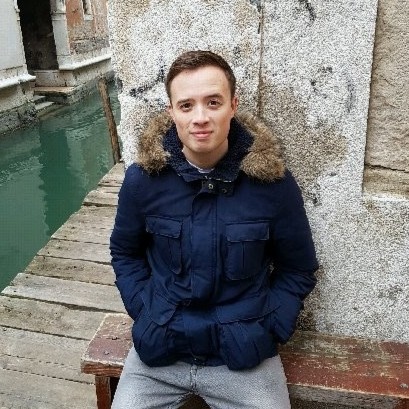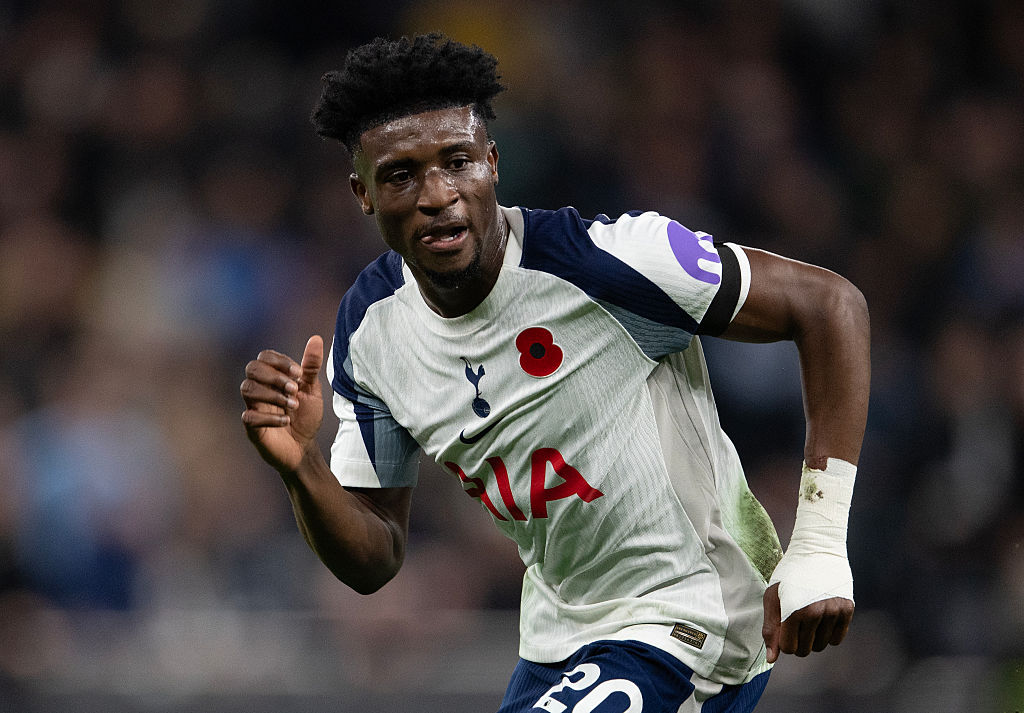FourFourTwo's 50 Best Football Managers in the World 2015: 40-36
Onwards through our list to profile Germany’s bright young upstart, a fiery Greek-Aussie... and Real Madrid’s new gaffer...
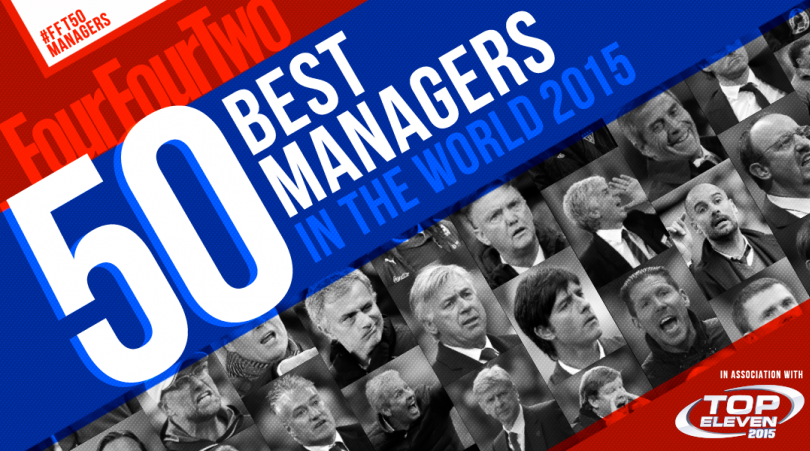
Words: Alima Hotakie, Zee Ko, Alex Holiga, Joe Brewin, Greg Lea.
40) Markus Weinzierl (Augsburg)
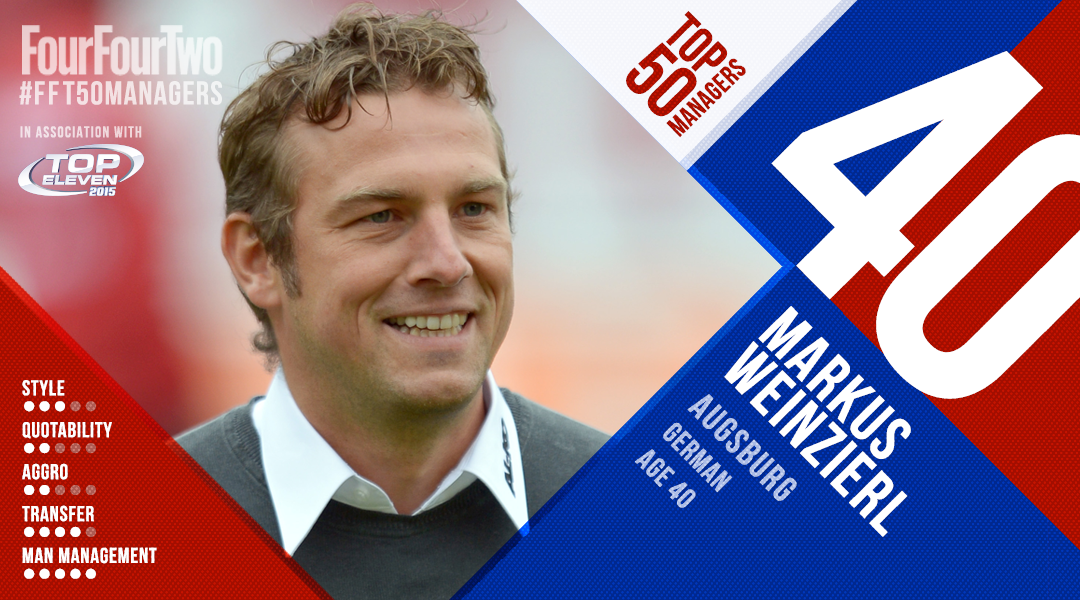
He's young, but has does an outstanding job. He's one of the best coaches in the Bundesliga. His team is aggressive, and plays very fast going forward
There seems to be a growing trend of clubs in the Bundesliga opting for younger and relative unknown coaches to help them rise to the top. Weinzierl has joined that list – and thrived.
The 40-year-old’s only coaching experience was in the lower leagues, but that didn’t stop him from taking a small club like Augsburg to the Europa League last season. The Bavarians are in many ways a model for other smaller clubs; the ultimate success story. With a limited budget of around €20 million, they finished fifth in Germany’s top flight, building on their terrific eighth place of 2013/14.
Opponents will tell you that Weinzierl’s side is one of the toughest sides to play against, with their neat passing and attacking game. But the road to success was bumpy. When Weinzierl first took over in 2012, it looked as if Augsburg were heading for relegation. The ex-Bayern Munich reserve reorganised his side, however, and after taking just nine points from 17 games they finished 15th and narrowly avoided the drop.
Slowly, the team spirit Weinzierl helped build began to pay off as a collective was formed. In his second season they came awfully close to securing a Europa League spot, collecting three more points than last year yet finishing three places worse off. This time they made it to Europe for the first time in their history. And for what it’s worth, it was Weinzierl’s Augsburg that brought an end to Bayern’s 53-game unbeaten streak in the spring of 2014. AHt
FEATURE Europe calling: how Markus Weinzierl became Germany’s most promising coach
The best features, fun and footballing quizzes, straight to your inbox every week.
39) Ange Postecoglou (Australia)
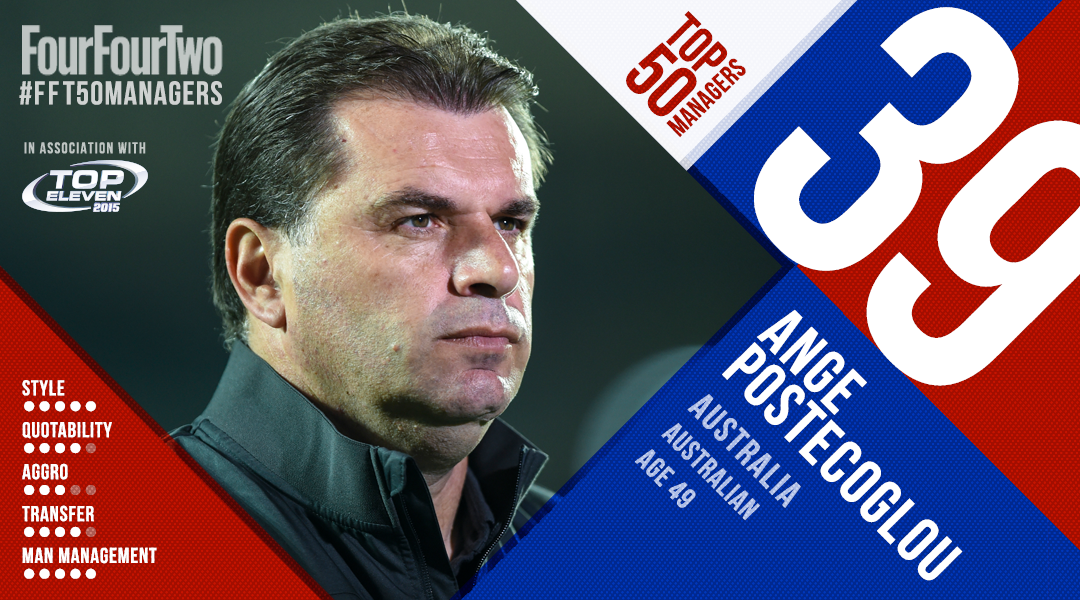
He’s brought the passion back to Australia. We kept getting written off, but he’s bought a fire back to us. I’ve never met anyone who loves this country and this team more than him. He’s got everyone behind the cause and firing in the right direction
With Postecoglou’s history of success, it was only a matter of time before his country came calling. Australia had just qualified for the World Cup finals, but were in poor shape after consecutive 6-0 friendly drubbings from Brazil and France. Morale was at an all-time low and Holger Osieck was hastily shown the door.
A serial winner as a coach in both the old National Soccer League and the current A-League, Postecoglou seemed a perfect fit. The two-time championship-winning coach with Brisbane Roar was then a year into his rebuilding efforts at Victorian heavyweights Melbourne Victory, but that was all put aside when the Socceroos job came up.
Just like at Victory, Postecoglou quickly put his stamp on the team, moving on several veterans and revitalising the squad with an injection of younger players. Overnight success wasn’t expected but the hungry, young Socceroos impressed many in Brazil despite being eliminated at the group stage.
They went from strength to strength, leading to a marvellous maiden Asian Cup triumph on home soil a few months later. To this date, Postecoglou still hasn’t lost a final at any level – seven and counting. ZK
38) Myron Markevych (Dnipro)
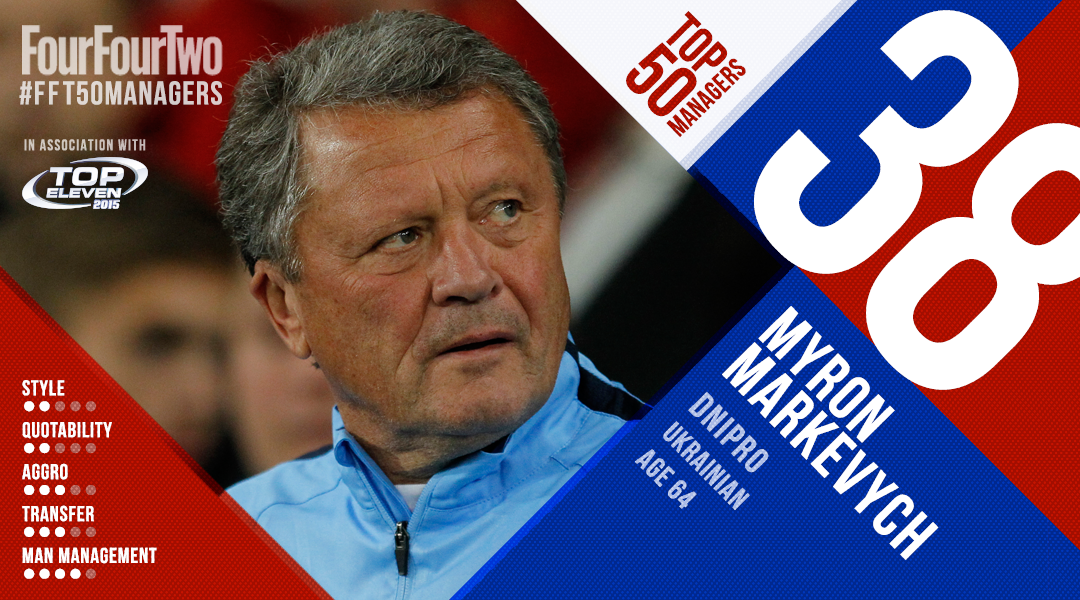
When Markevych came to us, he said: ‘Guys, you have a very good team, but in a tactical way you're too emotional.' He stopped those emotions, gave us his tactical exercises and we became calmer. We gained some self-assuredness
Markevych was a curious appointment for Dnipro. Succeeding Juande Ramos – the winner of five trophies with Sevilla and 2008 League Cup with Spurs – the 64-year-old Ukrainian definitely couldn’t match his predecessor’s star power. He’d spent nine years coaching Metalist Kharkiv, Dnipro’s fiercest rivals, winning them lots of third-place finishes in Ukraine before eventually going one step further to break the Kiev-Donetsk duopoly in 2013.
But next year, Metalist ran into financial difficulties, Markevych stepped down and it was Dnipro who finished as runners-up. However, as trouble continued brewing in Eastern Ukraine, Ramos left and Dnipro looked to the other side of the Skhidne Derby divide, signing Markevych ahead of last season.
At Kharhiv he favoured attacking football, but that changed. His Dnipro side became much more defensively tight and pragmatic. They usually sit deep and look for quick breaks, primarily utilising the pace and individual quality of their star winger, Yevhen Konoplyanka.
While Markevych hasn’t done anything special in a tactical sense – and Dnipro did have a lot of luck in their Europa League campaign – making it to the final of the continent’s ‘lesser’ competition warrants him a place on this list; especially considering that the team had to play their home games 250 miles away from home, in Kiev, due to the war in Eastern Ukraine. AHl
37) Frank de Boer (Ajax)
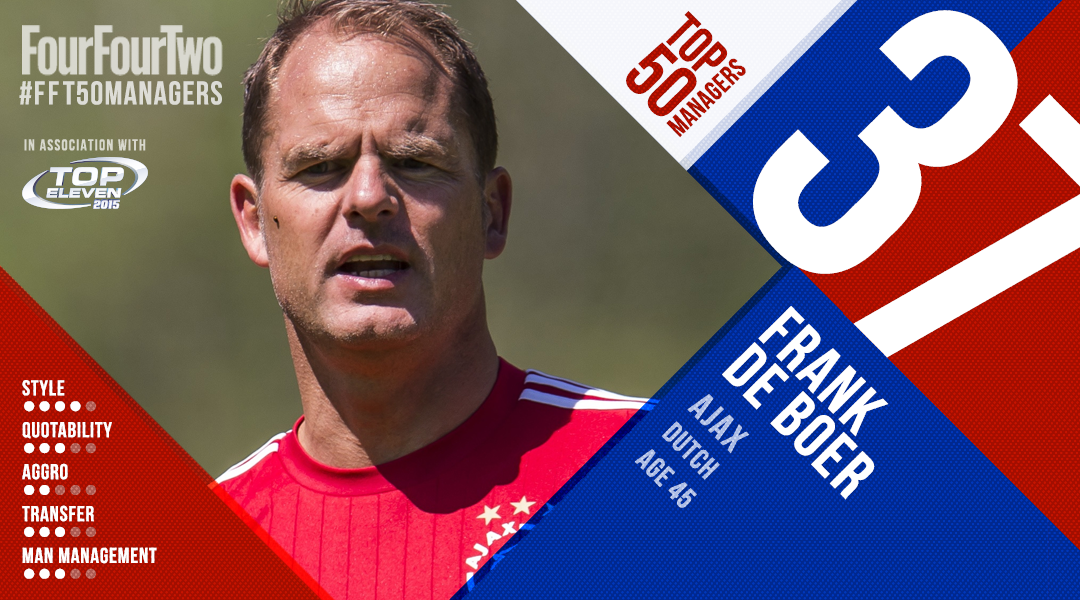
[Against Barcelona] we looked scared in possession. We lost the ball every time. De Boer told us not to s*** our pants at half-time. The second half was slightly better...
Last season was one to forget for De Boer. Ajax finished a horrifying 17 points behind PSV, were thumped 4-0 by Vitesse at home in the fourth round of the KNVB Cup, didn’t come close to getting out of their Champions League group, and then failed to make it past the last 16 of the Europa League.
But if football managers were judged by their most recent season, there wouldn’t be many of them still standing. De Boer is, after all, the manager who guided Ajax to four straight Eredivisie titles for the first time in the club’s history, in his first four seasons at the club. Year on year he rebuilt as key players were sold off to bigger suitors: in 2011 it was Luis Suarez and Maarten Stekelenburg; 2012, Jan Vertonghen, Gregory van der Wiel and Vurnon Anita; 2013, Christian Eriksen and Toby Alderweireld; 2014, Daley Blind and Siem de Jong.
Each time, De Boer has picked up the pieces and – save for last season – put together a team of winners. Lest we forget how incredibly young his current Ajax team is too: the average age of the 18 players who played at least 10 times last season was just 22.7.
Liverpool and Tottenham both courted the Dutchman for his services in recent seasons. A year on from now, they and others might be doing the same again. JB
36) Rafael Benitez (Real Madrid)
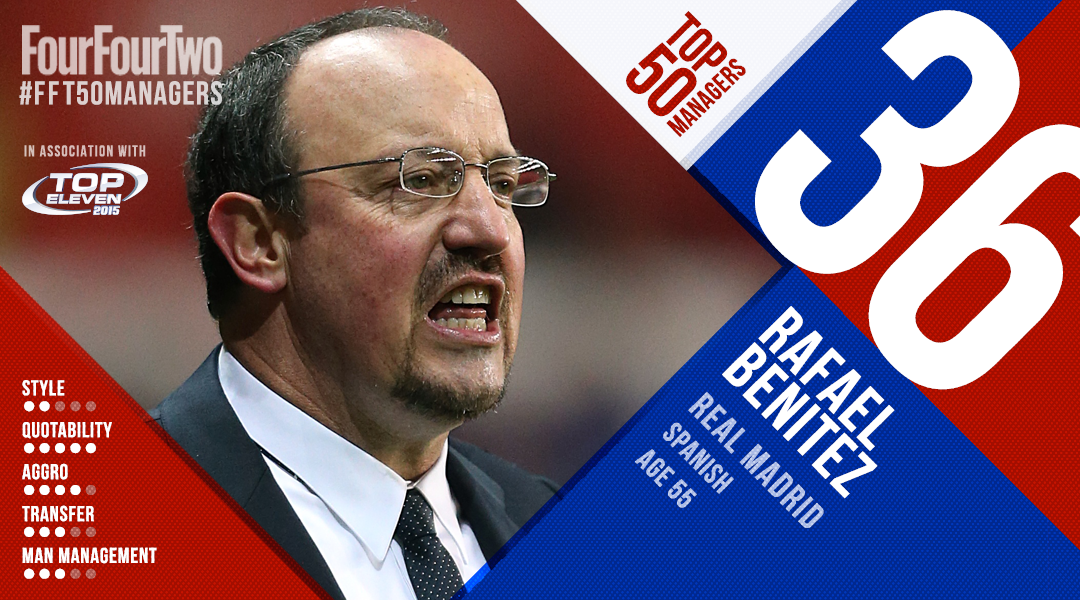
Defensively, Rafa was exceptional. He was very good on the opposition; how to nullify their threat and stifle their forward players. Nothing was left to chance. He was the first foreign manager I worked under and I learned quite a bit
Eyebrows were raised when Real Madrid decided to replace Carlo Ancelotti with Benitez this summer – and not just the Italian’s. Just a year after winning los Blancos’ fabled 10th European Cup, Ancelotti was dispensed in favour of a man who hasn’t won a single league title in over a decade.
The current perception of Benitez as a bumbling oddity is somewhat unfair, though. Yes, 2014/15 was clearly not the most successful season of his career, with Napoli exiting the Champions League in the qualifiers, finishing fifth in Serie A and coming unstuck against unfancied Dnipro in the semi-finals of the Europa League. When he was hired by the Partenopei two years ago and given the funds to sign the likes of Gonzalo Higuain, Jose Callejon and Dries Mertens, most expected them to challenge for a scudetto rather than trying to scrape into the top three.
Nevertheless, the 55-year-old is clearly an extremely talented coach. Breaking La Liga’s duopoly by winning not one, but two titles with Valencia in 2002 and 2004 was an astonishing achievement, as was reaching two Champions League finals in three years with Liverpool. Benitez may just surprise a few people in Spain next term. GL
FFT's 50 Best Football Managers: 50-46 • 45-41 • 40-36 • 35-31 • 30-26 • 25-21 • 20-16 • 15-11 • 10 • 9 • 8 • 7 • 6 • 5 • 4 • 3 • 2 • 1
#FFT50MANAGERS See our full list of top 50 managers in the world and features on them here
Joe was the Deputy Editor at FourFourTwo until 2022, having risen through the FFT academy and been on the brand since 2013 in various capacities.
By weekend and frustrating midweek night he is a Leicester City fan, and in 2020 co-wrote the autobiography of former Foxes winger Matt Piper – subsequently listed for both the Telegraph and William Hill Sports Book of the Year awards.
 Join The Club
Join The Club





